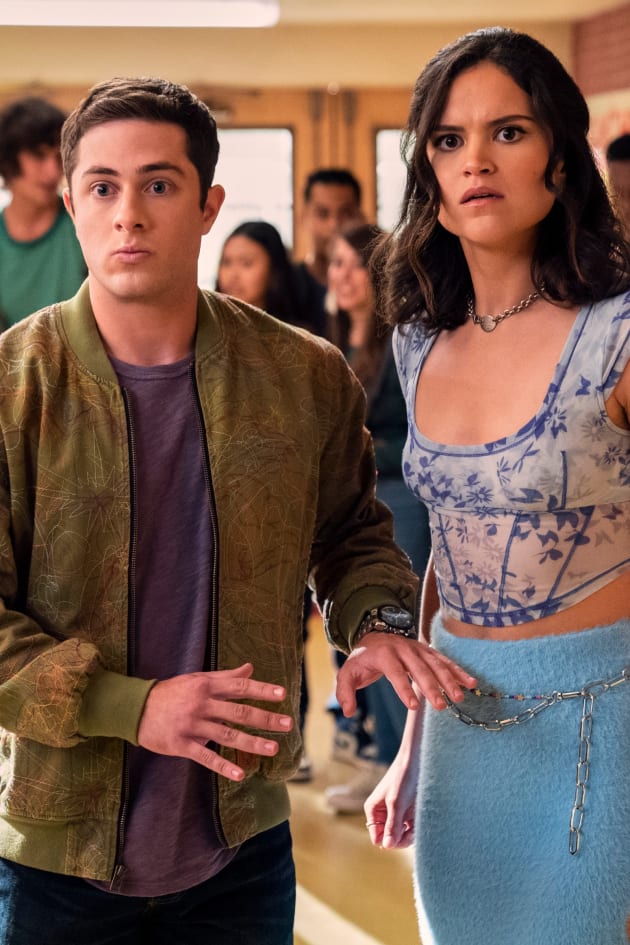I remember the moment I first encountered “Never Have I Ever.” I was scrolling through Netflix, looking for a lighthearted show to unwind after a stressful day. The title caught my eye, promising a relatable story about teenage struggles. After watching the first episode, I knew I had found something special. “Never Have I Ever” cleverly combines the awkwardness of adolescence with the heart-wrenching complexities of grief, all in a way that is both hilarious and profoundly moving. The first episode, aptly titled “Pilot,” sets the stage for a rollercoaster of emotions and hilarious situations that quickly captivated audiences.

Image: www.tvfanatic.com
For those who have yet to dive into this Netflix gem, “Never Have I Ever” follows the life of Devi Vishwakumar, a 15-year-old Indian-American teenager navigating the tumultuous waters of high school. The show opens with a devastating loss: Devi’s father, Mohan, tragically passes away. In the wake of this profound tragedy, Devi experiences intense emotional turmoil, dealing with her grief and adjusting to life without her father. The episode also introduces a complex cast of characters who will become central to Devi’s journey.
Introducing the Cast of Characters
The first episode introduces us to the core group of characters who will play significant roles in Devi’s life. We meet her best friends, Eleanor and Fabiola, both of whom offer different but equally important forms of support. Eleanor, the quirky and outspoken friend, provides Devi with much-needed laughter and a constant source of entertainment. Fabiola, who is shy and introspective, offers a quiet and understanding presence that allows Devi to open up about her struggles. The episode also introduces Paxton Hall-Yoshida, a handsome and popular senior who sparks Devi’s romantic interests. Paxton’s presence adds another layer of complexity to Devi’s life, as she grapples with her attraction to him while also dealing with her grief and the challenges of high school.
The first episode establishes the series’ core themes. Alongside the exploration of grief and adolescence, “Never Have I Ever” touches upon themes of identity, family, and the complexities of cultural identity. The pilot episode portrays Devi’s struggle with her Indian-American identity amidst the predominantly white environment of her high school. We see how Devi attempts to fit in with the popular crowd while also feeling pressure to embrace her Indian heritage. The show also highlights the importance of family and the lasting impact of parental relationships, emphasizing how Devi seeks guidance and support from her mother and grandmother in the wake of her father’s passing.
Devi’s Journey: Balancing Grief and Teenage Life
Devi, burdened by grief, decides to make a drastic decision: to become more popular. She embarks on a quest to transform her image, seeking to shed the label of “weird” and become the social butterfly she yearns to be. However, the episode shows the complexities of this pursuit, as Devi faces setbacks and realizes that popularity is not the answer to her emotional turmoil. “Never Have I Ever” masterfully balances humor and emotional depth. The episode is filled with relatable teenage moments, from navigating the awkwardness of social interactions to struggling with academic pressures. At the same time, it delves into the complexities of dealing with loss and the profound impact it has on a young person’s life.
The episode also introduces the unique voiceover narration by John McEnroe, which adds a layer of humor and poignancy to the story. McEnroe’s commentary provides a witty and insightful perspective on Devi’s experiences, mirroring her own anxieties and desires. He also serves as a catalyst for addressing the broader themes of the show, particularly the role of male figures in Devi’s life and the expectations placed upon them. McEnroe’s voiceover commentary adds a layer of complexity to the show, simultaneously grounding it in reality and allowing for moments of comedic exploration.
The first episode of “Never Have I Ever” offers a compelling introduction to a relatable and authentic portrayal of teenage life. It establishes the foundation for a character-driven story that explores the highs and lows of adolescence while tackling complex issues such as grief, identity, and cultural expectations. With its mix of humor, heartfelt moments, and a captivating protagonist, “Never Have I Ever,” as demonstrated in the first episode, promises a truly unforgettable journey for viewers.
Tips for Diving into the “Never Have I Ever” World
For those eager to delve into the world of “Never Have I Ever,” here are some tips to enhance your viewing experience:
- Embrace the Relatability: “Never Have I Ever” excels at portraying the universal experiences of adolescence. Whether you have experienced a momentous loss, struggled with fitting in, or grappled with romantic uncertainties, you are bound to find something relatable within the show.
- Engage with the Characters: The show’s dynamic characters are integral to its success. Spend time getting to know each individual’s motivations, struggles, and triumphs. Pay attention to their relationships, both with each other and within their families.
- Appreciate the Cultural Nuances: “Never Have I Ever” offers a unique perspective on Indian-American culture. Take the opportunity to learn about the traditions, values, and experiences that shape Devi’s life and worldview.
By embracing the relatability, engaging with the characters, and appreciating the cultural nuances, you will be rewarded with a rich and rewarding viewing experience. “Never Have I Ever” provides a unique window into teenage life and the complexities of navigating identity, loss, and the pursuit of happiness.

Image: trendtopusa.blogspot.com
FAQs about “Never Have I Ever” Season 1 Episode 1
Q: What are the main themes explored in the first episode?
A: The first episode of “Never Have I Ever” explores themes of grief, adolescence, identity, family, and cultural identity. The episode focuses on Devi’s struggle to process her father’s untimely death while simultaneously navigating the social landscape of high school. It also delves into Devi’s exploration of her Indian-American heritage as she seeks to find her place in the world.
Q: Why is John McEnroe’s voiceover commentary so effective?
A: John McEnroe’s voiceover commentary adds a layer of humor and poignancy to the story. His commentary provides an insightful and humorous perspective on Devi’s experiences, mirroring her own anxieties and desires. It also allows for a unique exploration of the broader themes of the show, specifically the role of male figures in Devi’s life.
Q: What are some of the key takeaways from the first episode?
A: The first episode emphasizes the importance of finding support and understanding in the face of loss, the complexities of teenage relationships, and the ongoing struggle of navigating cultural identity. It illustrates that even amidst the chaos and anxieties of adolescence, there is room for humor, laughter, and the pursuit of personal growth.
Never Have I Ever Season 1 Ep 1
Conclusion
In the first episode of “Never Have I Ever,” we are introduced to Devi, a relatable and compelling protagonist whose journey promises to be both hilarious and heartbreaking. The show seamlessly blends the awkwardness of teenage life with the complexities of grief, identity, and family dynamics. The episode’s clever use of humor, John McEnroe’s insightful voiceover, and the unique perspective on Indian-American culture creates a captivating experience that is guaranteed to leave you wanting more.
Are you ready to dive into the world of “Never Have I Ever” and discover the journey of Devi Vishwakumar?






